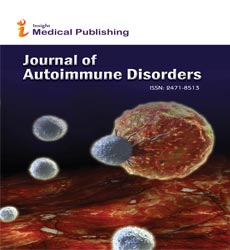Molecular Mechanisms of Immune Dysregulation in Autoimmune Disorders
Rita Jayson
Department of Immunology, NSW Health Pathology-ICPMR, Westmead Hospital, Sydney, Australia
Published Date: 2025-02-28DOI10.21767/2471-8513.11.1.111
Corresponding author:
Rita Jayson,
Department of Immunology, NSW Health Pathology-ICPMR, Westmead Hospital, Sydney, Australia,
E-mail: jayson.rita@westmead.au
Received date: February 01, 2025, Manuscript No. ipado-25-20464; Editor assigned date: February 03, 2025, PreQC No. ipado-25-20464 (PQ); Reviewed date: February 15, 2025, QC No. ipado-25-20464; Revised date: February 22, 2025, Manuscript No. ipado-25-20464 (R); Published date: February 28, 2025, DOI: 10.21767/2471-8513.11.1.111
Citation: Jayson R (2025) Molecular Mechanisms of Immune Dysregulation in Autoimmune Disorders. J Autoimmune Disord Vol.11.No.1: 111.
Introduction
Autoimmune disorders represent a diverse group of diseases characterized by the immune systemâ??s inability to distinguish between self and non-self. Instead of providing defense against pathogens, the immune system mistakenly attacks healthy tissues, leading to chronic inflammation and tissue destruction. Conditions such as Systemic Lupus Erythematosus (SLE), Rheumatoid Arthritis (RA), Multiple Sclerosis (MS) and type 1 diabetes (T1D) exemplify the spectrum of autoimmune pathologies. Although their clinical manifestations vary, all share a common hallmark: immune dysregulation. Recent advances in molecular biology and immunology have shed light on the intricate mechanisms that underlie this dysregulation, pointing to a complex interplay of genetic predisposition, epigenetic modifications, environmental triggers and cellular signaling pathways [1,2].
Description
One central molecular mechanism in autoimmune disorders is the loss of immune tolerance, both central and peripheral. Central tolerance, which occurs in the thymus and bone marrow, eliminates autoreactive T and B cells during development. However, genetic mutations in key molecules such as AIRE (autoimmune regulator) and FOXP3 (critical for regulatory T cell function) can disrupt this process, allowing self-reactive lymphocytes to escape deletion. Peripheral tolerance, mediated by regulatory T cells (Tregs), anergy and apoptosis, is equally essential. When Treg activity is compromised, as observed in autoimmune patients, autoreactive lymphocytes persist, promoting tissue damage [3].
Another key factor involves aberrant antigen presentation and cytokine signaling. Overexpression of major histocompatibility complex (MHC) molecules or altered antigen processing by dendritic cells can enhance the presentation of self-antigens, stimulating autoreactive T cells. Dysregulated cytokine networks, particularly the overproduction of pro-inflammatory mediators such as IL-6, TNF-ñ and IFN-ó, amplify inflammation and perpetuate tissue injury. For instance, Th17 cells, driven by IL-23, have been implicated in multiple sclerosis and rheumatoid arthritis due to their strong inflammatory potential. Moreover, signaling pathway disruptions, including abnormalities in NF-úB, JAK-STAT and MAPK cascades, further tilt the balance toward chronic immune activation [4].
Molecular mechanisms are also influenced by epigenetic and environmental factors. Epigenetic modifications such as DNA methylation defects, histone acetylation changes and microRNA dysregulation alter gene expression in immune cells, predisposing individuals to autoimmunity. For example, hypomethylation of genes encoding immune receptors in lupus patients results in excessive autoreactivity. Environmental triggers, including viral infections, gut microbiota imbalances and exposure to toxins, can initiate molecular mimicry, where pathogen-derived antigens resemble host proteins, leading to cross-reactive immune responses. These interactions highlight the multi-layered regulation of the immune system and the delicate molecular balance that, when disturbed, results in autoimmunity [5].
Conclusion
Autoimmune disorders arise from a multifaceted breakdown of immune tolerance and regulation at the molecular level. Genetic mutations, aberrant cytokine signaling, epigenetic dysregulation and environmental triggers collectively drive immune dysfunction. Understanding these molecular mechanisms not only clarifies the etiology of autoimmune diseases but also opens new therapeutic avenues. Targeted interventions such as cytokine inhibitors, immune checkpoint modulators and epigenetic therapies are currently being explored to restore immune balance. As research advances, unraveling the complexities of immune dysregulation holds promise for developing precision medicine approaches that can transform the management of autoimmune disorders.
Acknowledgment
None.
Conflict of Interest
None.
References
- Warrington R, Watson W, Kim HL, Antonetti FR (2011). An introduction to immunology and immunopathology. Allergy Asthma Clin Immunol 7: S1.
Google Scholar Cross Ref Indexed at
- Burnet FM (1972). A reassessment of the forbidden clone hypothesis of autoimmune disease. Australian J Exp Bio Med Sci 50.
Google Scholar Cross Ref Indexed at
- Tauber AI, Podolsky SH (1994). Frank Macfarlane Burnet and the immune self. J Hist Biol 531-573.
Google Scholar Cross Ref Indexed at
- Pisetsky DS (2023). Pathogenesis of autoimmune disease. Nat Rev Nephrol 19: 509-524.
Google Scholar Cross Ref Indexed at
- Barrett JC, Hansoul S, Nicolae DL, Cho JH, Duerr RH, et al. (2008). Genome-wide association defines more than 30 distinct susceptibility loci for Crohn's disease. Nat Genet 40: 955-962.
Open Access Journals
- Aquaculture & Veterinary Science
- Chemistry & Chemical Sciences
- Clinical Sciences
- Engineering
- General Science
- Genetics & Molecular Biology
- Health Care & Nursing
- Immunology & Microbiology
- Materials Science
- Mathematics & Physics
- Medical Sciences
- Neurology & Psychiatry
- Oncology & Cancer Science
- Pharmaceutical Sciences
